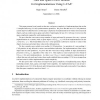Free Online Productivity Tools
i2Speak
i2Symbol
i2OCR
iTex2Img
iWeb2Print
iWeb2Shot
i2Type
iPdf2Split
iPdf2Merge
i2Bopomofo
i2Arabic
i2Style
i2Image
i2PDF
iLatex2Rtf
Sci2ools
WDAG
2005
Springer
2005
Springer
Time and Space Lower Bounds for Implementations Using k-CAS
This paper presents lower bounds on the time- and space-complexity of implementations that use the k compare-and-swap (k-CAS) synchronization primitives. We prove that the use of k-CAS primitives cannot improve neither the time- nor the space-complexity of implementations of widely-used concurrent objects, such as counter, stack, queue, and collect. Surprisingly, the use of k-CAS may even increase the space complexity required by such implementations. We prove that the worst-case average number of steps performed by processes for every n-process implementation of a counter, stack or queue object is Ω(logk+1 n), even if the implementation can use j-CAS for j ≤ k. This bound holds even if a k-CAS operation is allowed to read the k values of the objects it accesses and return these values to the calling process. We also consider more realistic non-reading k-CAS primitives. An operation of a non-reading kCAS primitive is only allowed to return a success/failure indication. For impleme...
Related Content
| Added | 28 Jun 2010 |
| Updated | 28 Jun 2010 |
| Type | Conference |
| Year | 2005 |
| Where | WDAG |
| Authors | Hagit Attiya, Danny Hendler |
Comments (0)

